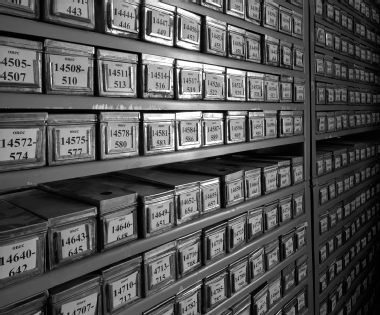Látható sötétség | Farkas Dénes
megnyitó | 2018. január 31. 18:00
a kiállítást megnyitja | Petrányi Zsolt
web | http://molnaranigaleria.hu
a kiállítás bezárása | 2018. március 6.
cím | Molnár Ani Galéria, (1088, Budapest, Bródy Sándor utca 36.)
Farkas Dénes Látható sötétség című egyéni kiállítása arra keres választ, hogy a jövő és jelen tényleges és lehetséges formái hogyan határozhatók meg az adaptáció, a dokumentáció és az archiválás gyakorlatán keresztül. A fotókból és szövegekből álló kiállítás két fő inspirációs forrással rendelkezik. A vizuális anyagot a világ négy különböző pontjain megtalálható magbankokban készítette a művész: a spitzbergáki Global Seed Bankben, a Szentpéterváron található N.I.Vavilov Research Institute of Plant Industryban, a terboli International Center for Agricultural Research in the Dry Areasban és az American University of Beirut magbankjában. Ezek az intézmények azzal a céllal jöttek létre, hogy a világon megtalálható növényekből és azok magjaiból egy archívumot hozzanak létre, és estleges világkatasztrófa esetén felhasználják őket. A kiállítás szöveges részét kitevő idézeteket a libanoni-amerikai író, Rabih Alameddine An Unnecessary Woman című könyve adja. A regény egy idősödő nő belső monológja, aki nyugati irodalom arabra fordításának szenteli minden idejét.
Az adaptáció kettőssége, az arra irányuló vágyakozás és abszurditás, mélyen gyökerezik Farkas Dénes fotó- és szövegpárosításaiban. A magbankok, melyek célja a természet és ezzel együtt az emberiség túlélésének szolgálata, izolált építmények, ahol mesterséges körülményeket előállítva tartják életben a növényeket. Ennek analógiájaként értelmezhetők a könyvben szereplő írónő fordításai is – csak önmaga számára maradnak meg, egy „dobozt” alkotva, az ezen kívül eső világban már nem értelmezhető a tevékenysége. Bár a cél más, az alkotás és annak elszigetelt megőrzése (create and crate) mindkét esetben megtalálható. Ambivalenciát hív elő, és egyben érdekes helyzetet teremt a természet és az emberiség alkotó és pusztító erejének összemérésére.
A fotósorozaton látható dobozokban rácsok mögött felcímkézett magokat, növényeket és növénymaradványokat őriznek, elbújtatva a világ szeme elől. A lét és a nemlét mezsgyéjén; hiszen természetes közegüktől távol, eredeti funkciójuktól pedig megfosztva, egy bizonytalan jövőnek elraktározva létezik ez az archív flóra. A melléjük párosított szövegrészletek pedig erősítik, kitárják az értelmezés dimenzióit a néző számára. Megtartva az emberiség jövőjének tényleges és lehetséges valóságát, amely egyben egy reménnyel és sötét ómenekkel teli jövőkép.
A katalogizált magokból felépített archívumok, akár az írónő önkényszerű fordításlistájának idézetei, szokatlan időbeli párhuzamokat teremtenek a valóságból kirángatott jelen és egy bizonytalan, fiktív jövő között, felhívva a figyelmet arra, hogy a normalitást és a normalitás illúzióját csak egy vékony vonal választja el egymástól.
Farkas Dénes (1974) Budapesten született, Tallinnban él és dolgozik. 2013-ban Észtországot képviselte az 55. Velencei Biennálén. Munkáit rangos intézményekben állították ki többek között az EKKM, KUMU és a Tartu Art Múzeumban, Tallinnban és a Ludwig Múzeumban, Budapesten.
//
Dénes Farkas’ solo exhibition, entitled Darkness Visible, raises the questions; if the present’s and future’s possible and actual positions can be determined by the practice of adaptation, documentation and archives. The exhibition, which consists of photographs and texts was born two main inspirations. The artist photographed the visual material at four various seed banks, which can be found in different points of the world. At the Global Seed Bank in Svalbald, the N.I.Vavilov Research Institute of Plant Industry in St. Petersburg, Russia, the International Center for Agricultural Research in the Dry Areas in Terbol, Lebanon and the seed bank of the American University of Beirut in Lebanon. These institutions were established with the goal of building an archive of the world’s seeds and plants to be used in the case of a global catastrophe. The quotes appearing in the exhibition are taken from the Lebanese-American writer, Rabih Alameddine’s novel An Unnecessary Woman. The book follows the inner monologue of an elderly woman, who devotes all her time to translating western literature into Arabic language.
The aspiration towards adaptation, its duality and absurdity is deeply rooted in Dénes Farkas’ photo and text pairings. These seed banks, which were built to preserve nature and serve the survival of humanity are isolated buildings, where the plants are kept alive in superficial environments. On the same analogy, the transcripts of the elderly woman in the novel can be interpreted – the translated texts only remain for herself, this way creating a ‘box’, where the outside world does not make sense. Although their goals differ, the will to create and crate exists in both cases. It constructs ambivalence and also an interesting angle to commensurate the creating and destructive powers of both humanity and nature.
In the photographs, the plants, plant-pieces and seeds, that are stored in boxes and locked behind metal fences, are hidden from the eyes of the world. On the borderline of existence and non-existence, hence they are removed from their natural habitat, striped off their original purpose, stored away this archive flora lives. The quotes paired with the imagery amplify and broaden the dimensions of meaning for the viewer. Keeping in mind, that the possible and actual reality of humanity’s future is simultaneously filled with hopes and dark omens.
These archives of catalogued seeds, just like the quotes of the author’s arbitrary list of translations present an unusual parallel of time, between the present which is rived off reality, and an uncertain, fictive future. Drawing attention to the fact that normality and the illusion of such is divided only by a thin line.
Dénes Farkas (1974) was born in Budapest, lives and works in Tallinn. In 2013 he represented Estonia at the 55th Venice Biennale. His works have been exhibited at prestigious art events and museums, such as at the EKKM, KUMU or Tartu Art Museum, Tallinn or at the Ludwig Museum, Budapest.

Térkép
Ne elégedjen meg az artKomm levelek olvasásával!
Az ikOn weboldalán kilistázhatja a mai/holnapi/holnaputáni eseményeket!





















